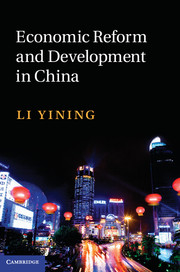Book contents
- Frontmatter
- Contents
- Li Yining: Biographical Note
- Preface to the Cambridge Edition
- Preface
- Foreword
- 1 The role of education in economic growth (1980)
- 2 Effective and rational investment under socialism (1982)
- 3 Basic thoughts on economic restructuring (1986)
- 4 A tentative study of socialist ownership structure (1987)
- 5 Two types of disequilibrium and the mainstream of current economic restructuring (1988)
- 6 Relationship between economic reform, growth and industrial restructuring (1988)
- 7 Laying a solid foundation for new culture (1989)
- 8 Cultural economics: a tentative study (1990)
- 9 Environmental protection and compensation to victims of environmental damage (1990)
- 10 Coordinating economy and environment in less developed regions (1991)
- 11 Comparative economic history and the modernization of China (1993)
- 12 Growth and fluctuations in economic disequilibrium (1993)
- 13 Property rights reform of rural enterprises (1994)
- 14 Rationality and proportionality in income distribution (1994)
- 15 Meshing fiscal policy with monetary policy (1997)
- 16 The dual foundations of efficiency (1998)
- Glossary
- Index
8 - Cultural economics: a tentative study (1990)
- Frontmatter
- Contents
- Li Yining: Biographical Note
- Preface to the Cambridge Edition
- Preface
- Foreword
- 1 The role of education in economic growth (1980)
- 2 Effective and rational investment under socialism (1982)
- 3 Basic thoughts on economic restructuring (1986)
- 4 A tentative study of socialist ownership structure (1987)
- 5 Two types of disequilibrium and the mainstream of current economic restructuring (1988)
- 6 Relationship between economic reform, growth and industrial restructuring (1988)
- 7 Laying a solid foundation for new culture (1989)
- 8 Cultural economics: a tentative study (1990)
- 9 Environmental protection and compensation to victims of environmental damage (1990)
- 10 Coordinating economy and environment in less developed regions (1991)
- 11 Comparative economic history and the modernization of China (1993)
- 12 Growth and fluctuations in economic disequilibrium (1993)
- 13 Property rights reform of rural enterprises (1994)
- 14 Rationality and proportionality in income distribution (1994)
- 15 Meshing fiscal policy with monetary policy (1997)
- 16 The dual foundations of efficiency (1998)
- Glossary
- Index
Summary
Peculiarities of cultural and art products
Cultural economics is not concerned with the process by which cultural and art products are produced but with the economic issues pertinent to the production and reproduction of such products. Thus something has to be said about the attributes of cultural and art products. In terms of economics, they fall into two categories: those in the form of physical commodity, like audiovisual products, fine arts, books and periodicals; and those in the form of service, that is, labor services provided by cultural and art organizations, such as performance art. In comparison with material production, the production of cultural and art products is unique in that it is more individualistic and creative. Looking back, we may find nothing inappropriate with the way we categorize cultural and art products and interpret their peculiar attributes. However, if we probe the issue of cultural economics more deeply, we will know where the problems are.
If, for instance, a novelist or playwright comes up with a novel or a drama script, the first material form of his brainchild is a manuscript instead of a published book. This manuscript must be recognized and accepted by editors of a press or a journal before it turns into the book form and is sold on the market. Thus the material forms of cultural and art products we see on the market are a kind of “collective” product, that is, products brought into being “collectively” not only by authors but also by editors, printers, and the like.
- Type
- Chapter
- Information
- Economic Reform and Development in China , pp. 137 - 146Publisher: Cambridge University PressPrint publication year: 2012



